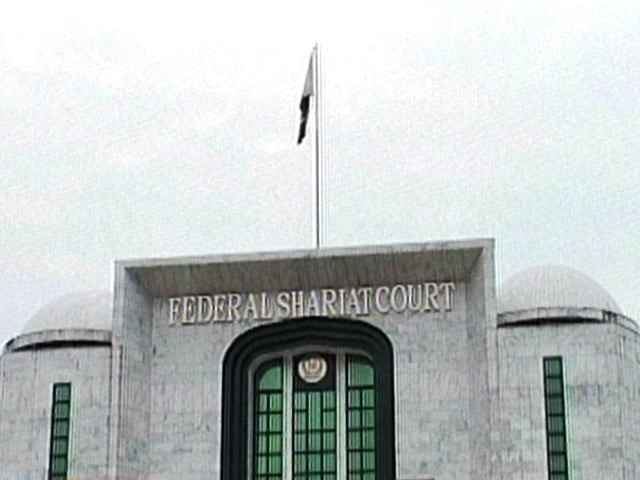Women Protection Act: Top Islamic court rules against law
Govt decides to challenge Federal Shariat Court ruling.

Women Protection Act: Top Islamic court rules against law
The government on Wednesday decided to challenge in the Supreme Court a Federal Shariat Court’s (FSC) judgment declaring some clauses of the Protection of Women Act-2006 as “violative of the Constitution.”
“We will move the Shariat Appellate Bench of the Supreme Court for the suspension of today’s ruling,” a law ministry official told The Express Tribune, requesting anonymity.
“Sections 11 and 28 of the Protection of Women Act-2006 are hereby declared ultra vires to Article 203DD of the constitution because these provisions annulled the overriding effect of the Hudood Ordinance-1979,” FSC Chief Justice Agha Rafiq Ahmed Khan, who was heading the three-member bench, said in the ruling.
Referring to its jurisdiction, the FSC verdict said that “no legislative instrument can control, regulate or amend this jurisdiction which was mandated in Chapter 3A of Part VII of the constitution of Pakistan.”
Aslam Ghumman, Shahid Orakzai, Abdul Latif Sufi and Mian Abdul Razzaq Aamir had filed identical petitions in the FSC challenging various sections of the Protection of Women Act-2006 and the Pakistan Penal Code (PPC).
The judgment has sparked a constitutional debate on the FSC’s powers to rule on the constitutionality of any law.
Former president of the Supreme Court Bar Association Qazi Anwer told The Express Tribune that the Federal Shariat Court has no constitutional authority to declare any law as against the constitution.
The constitution authorises the FSC to rule on any law which is repugnant to Islamic injunctions in light of the Holy Quran and traditions of Prophet Muhammad (pbuh). “Constitutionally, only high courts and the Supreme Court are empowered to decide whether or not any law is contrary to the constitution,” Anwer explained.
“Out of respect for the judiciary I would not say that the FSC has exceeded its constitutional authority,” he said, however. Anwer referred to Article 203DD of the constitution.
It says, “The court may, either of its own act or on the petition of a citizen of Pakistan or the federal government or a provincial government, examine and decide the question whether or not any law or provision of law is repugnant to the injunctions of Islam, as laid down in the Holy Quran and Sunnah of the Holy Prophet (pbuh).”
Another constitutional expert Barrister Baacha, while commenting on the judgment, told The Express Tribune that the FSC has exceeded its constitutional mandate. “The Supreme Court should take souo moto action on the FSC ruling,” he added.
Bachaa said the SC has also accepted that the parliament is the supreme body to make any law or constitutional articles.
The FSC, in its judgment, said that “the extent of jurisdiction of the FSC in matters relating to Hudood under Article 203DD is exclusive and pervades the entire spectrum of orders passed or decision given by any criminal court under any law relating to the enforcement of Hudood and no other court is empowered to entertain appeal, revision or reference in such cases. No legislative instrument can control, regulate or amend this jurisdiction which was mandated in Chapter 3A of Part VII of the constitution.”
The FSC judgment also restored the Hudood laws that require an adultery victim to produce four eyewitnesses for “the registration of a case with police.
The Human Rights Commission of Pakistan have long criticised the Hudood laws.
However, under the Protection of Women Act 2006, this condition has been removed. Similarly, the victim women cannot be convicted on the basis of her complaint.
According to the procedure and rules, it would be binding on the government to make legislation in light of the FSC judgment within 60 days after the passage of the judgment or it would automatically become a law.
The FSC has enhanced the scope of Hudood laws in its judgment. The court ordered that “Irtdad (apostasy) Baghy (one who wages war against state) Qisas (right of retaliation in offences against human) and human trafficking are covered by the term Hudood for the purpose of Article 203DD of the constitution.
Published in The Express Tribune, December 23rd, 2010.



















COMMENTS
Comments are moderated and generally will be posted if they are on-topic and not abusive.
For more information, please see our Comments FAQ